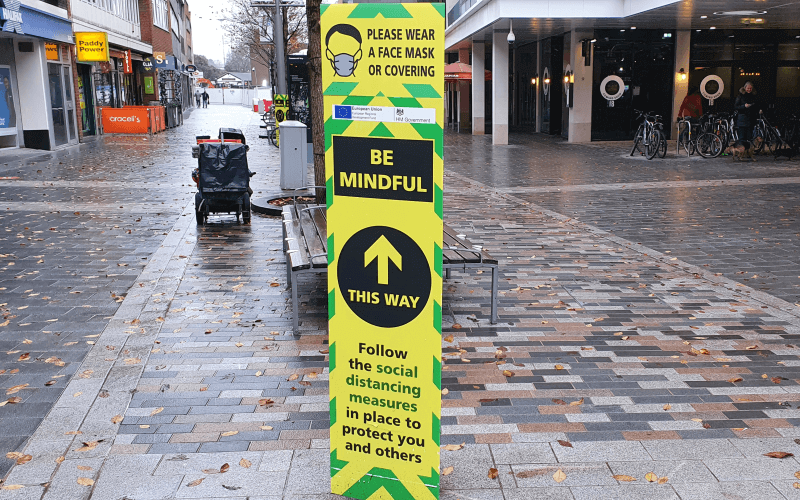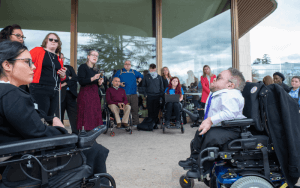Disabled people and others who have been most severely affected by COVID-19 have largely been ignored by those in power who drew up policies and plans to respond to the pandemic, according to a new book.
The e-book, published by Policy Press in two volumes* and available free to download, argues that the failure to adopt more “collaborative, diverse, and inclusive” responses to the health and social care challenges created by the crisis has increased the fatal toll of the pandemic.
It also explores how disabled people and others have continued to be “ignored, disempowered, and discriminated against” in health and social care research, policy, and practice.
And it argues that greater use of co-production – where service-users, professionals and decision-makers work together as equal partners in planning and policy-making – could reduce the toll of both the current pandemic and future health emergencies.
Those particularly impacted negatively by the pandemic, it says, include disabled people and those with long-term health conditions; black, Asian and minority ethnic groups; people living in deprived areas and poor housing; and older people.
But these are the groups who have largely been ignored in developing responses to the crisis, and as a result have been “further detrimentally impacted by it – in many cases fatally”, according to the e-book’s introduction.
“Disabled people with vast experience of social isolation could have made valuable contributions to ‘shielding’ policies and social care provision and yet typically were not invited to contribute to decision-making processes,” it adds.
The collection of chapters by a range of authors, including leading disabled campaigners, calls for marginalised voices to be better heard through co-production.
In his chapter, Professor Peter Beresford, chair of Shaping Our Lives, compares the pandemic efforts of frontline NHS health workers with the “arbitrary and sweeping decisions” of senior NHS managers to “clear out thousands of older, long-term patients” into care homes and domiciliary services, which “then caused the infection to spread on a massive scale”.
He says that the NHS’s actions, which used “social care as a dustbin for COVID-19 casualties” were made “doubly dangerous and discriminatory by the appalling state of social care in England”.
Beresford was first approached by Policy Press to write a book on co-production in the pandemic and then worked with other service-users and researchers as co-editors.
He says that one of the many disasters of the UK government’s response to the pandemic has been how it has ignored both “old-stye experimental research” and “new user-led and co-produced approaches”.
He says that little if any effort was made to involve those groups most at risk in the pandemic in developing policy, practice, or research.
He says in his chapter: “This was despite their requests to do so and although the experience of many, from living a life routinely ‘locked-down’, could have offered very helpful insights into developing evidence-based policy and practice to combat resulting mental distress and other damaging effects.”
Beresford adds: “It was as if the thinking was that this crisis is too urgent, there just isn’t time to listen to people in the firing line, however much we recognise the value of that in normal times.”
In their chapter, disabled activists Ellen Clifford – author of The War on Disabled People – and Mark Dunk argue that governments have “widely failed to consult disabled people or to consider the impacts of their strategies on the most disadvantaged in society”.
They say that the scale of the disproportionate impact of COVID-19 on disabled people –about three-fifths (59 per cent) of COVID-19-related deaths in England during the pandemic have been of disabled people – has “not been reflected in the response to the crisis”.
Clifford and Dunk are due to speak at a launch event for the book on 22 June.
*COVID-19 and Co-production in Health and Social Care Research, Policy, and Practice: Volume 1: The Challenges and Necessity of Co-production; and Volume 2: Co-production Methods and Working Together at a Distance
A note from the editor:
Please consider making a voluntary financial contribution to support the work of DNS and allow it to continue producing independent, carefully-researched news stories that focus on the lives and rights of disabled people and their user-led organisations.
Please do not contribute if you cannot afford to do so, and please note that DNS is not a charity. It is run and owned by disabled journalist John Pring and has been from its launch in April 2009.
Thank you for anything you can do to support the work of DNS…

 Government’s response to UN committee ‘was insult to disabled people’
Government’s response to UN committee ‘was insult to disabled people’ It was emergency planning that was vulnerable during Covid, not disabled people, inquiry is told
It was emergency planning that was vulnerable during Covid, not disabled people, inquiry is told Sunak suggests he wants to lead fresh assault on disability benefits spending
Sunak suggests he wants to lead fresh assault on disability benefits spending